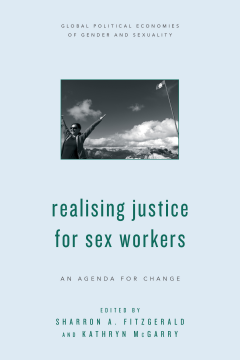
Additional Information
Book Details
Abstract
In the past two decades, feminist politics on prostitution has become more polarised and ideological. On the one hand, those on the radical spectrum of feminist politics have fought long and hard to criminalise sex purchase with the intention of ultimately abolishing prostitution. Other feminists have lobbied the state to recognise and institutionalise sex workers’ human rights.
The collection is both a critical intervention in and a re-orientation of the schism in contemporary feminist prostitution politics. Contributors will use this schism as a platform from which to challenge current debates, and ‘think’ an alternative sex worker-centred politics for social justice. By placing sex workers’ lived experiences of prostitution at the centre of the conversation, the book rejects the hegemony of neo-abolitionism as the solution to the ‘problem’ of sex work.
The book brings international, trans-disciplinary scholars together to address a rights-based agenda for sex work law and policy and consequently for sex workers’ lives. This collection offers an invaluable resource on the subject of how sex workers experience injustices and how we can mitigate this globally through a transformative vision of social justice.
Through the lens of social rather than criminal justice, this lively collection of essays asks questions about how the rights of sex workers can be realised, with the ambition of finding real possibilities for positive social change. Embedding the needs, choices, circumstances and experiences of sex workers in everyday institutions, policies and services, the task ahead to achieve full citizenship is made clear. Calling for an Agenda for Change, these authors showcase exciting new empirical work which moves the focus from the individual sex worker to broader conditions we all should be privy to in a civilised society. The topics covered embrace a whole range of issues: equality; governance; legislation; migration; gender; rights and racism.
Teela Sanders, Professor of Criminology, University of Leicester
Never at any other time in history have sex workers been so vocal and organised in defence of their rights. In a context of increased criminalisation and ideology-based prohibitionism, Realising Justice for Sex Workers offers new ideas and innovative approaches which prioritise sex workers’ needs and demands as part of its collaborative and transformative “Agenda for Change’.
Luca Stevenson, Coordinator of the International Committee on the Rights of Sex Workers in Europe
Sharron A. FitzGerald teaches in gender and migration studies at Ludwig-Maximilian University, Munich, Germany.
Kathryn McGarry is a lecturer in Social Policy in the Department of Applied Social Studies, Maynooth University.
These thoughtful essays lay out a compelling argument for decriminalization as the first step in achieving recognition and redistributive justice for sex workers. They also detail the need for new forms of knowledge of sex work, gained from incorporating sex workers in the deliberative process.
Judith Walkowitz, Professor Emerita of History, Johns Hopkins University
Despite the inherent legality of prostitution in most jurisdictions, sex workers remain stigmatised and made vulnerable by laws and policies that treat them as criminal or exploited. This important volume addresses this head-on, and asks what rights sex workers should have if they are to be given the liberties and freedoms most take for granted. Drawing on case studies from a range of international contexts, and informed by a range of theoretical perspectives, this fascinating book goes beyond description to offer a prescription that will be essential reading for all scholars of sex work.
Phil Hubbard, Professor of Urban Studies, Kings College London
Table of Contents
| Section Title | Page | Action | Price |
|---|---|---|---|
| Contents | vii | ||
| Foreword. Agenda for Change | ix | ||
| Acknowledgements | xiii | ||
| Introduction. Social Justice through an Agenda for Change | xv | ||
| Chapter 1. Racism, Xenophobia and Hegemonic Masculinity: The Nordic Model of Criminalising the Purchase of Sex | 1 | ||
| Chapter 2. The Impact of Criminalisation on Indoor Sex Workers in England and Wales and the Need for Legislative Change | 21 | ||
| Chapter 3. Feminists, Step Back! (Re)centring and Supporting Sex Workers’ Political Projects | 41 | ||
| Chapter 4. Selling Sex: What Influences or Displaces Perceptions of Agency? | 61 | ||
| Chapter 5. Universities as Spaces of Sexual Diversity: Students Engaged in Sex Work in Amsterdam | 81 | ||
| Chapter 6. Examining and Challenging the Everyday Power Relations: Affecting Sex Workers’ Health | 103 | ||
| Chapter 7. Decriminalisation and Social Justice: A Public Health Perspective on Sex Work | 123 | ||
| Chapter 8. Turning Perspectives on Migrant Sex Workers Inside Out: From Criminalisation and Victimisation to Rights-Based Law and Policy | 141 | ||
| Chapter 9. Sex Worker Rights, Recognition and Resistance: Towards a ‘Real Politics of Justice’ | 161 | ||
| Chapter 10. Into the Light: A Model of Justice for Workers’ Rights in the Shadow and Gig Economy | 183 | ||
| Chapter 11. Reconceptualising On-Street Sex Work as a Complex Affective Social Assemblage | 203 | ||
| Index | 223 | ||
| About the Contributors | 229 |
